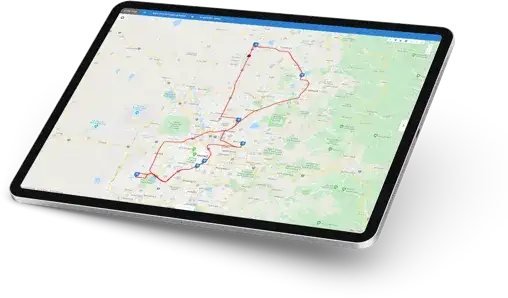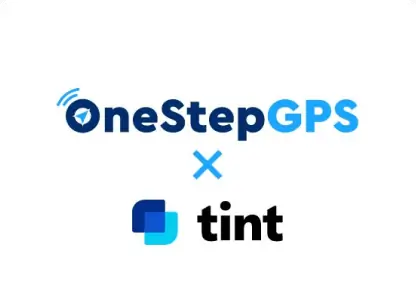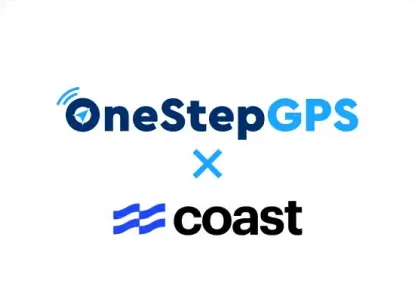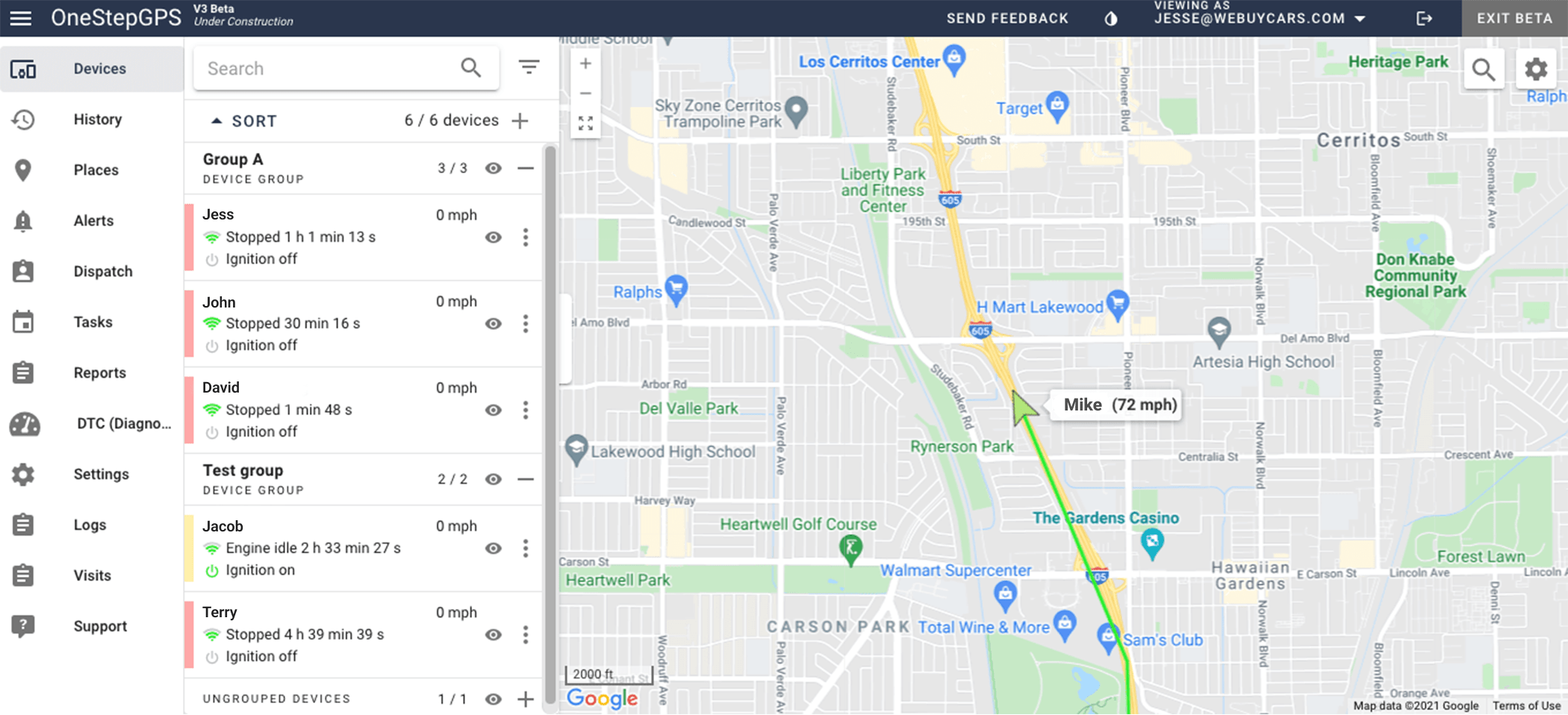Choosing Fleet Tracking Devices
Published on Aug 12th, 2024How do you choose the correct fleet tracking device for your needs?
What if you have 10 different vehicle types, will they be compatible with each?
They all look the same and say they do the same things, so which do you pick?
Comparing options for fleet tracking devices can be time-consuming with the endless streams of different devices and platforms—it’s tough to tell the difference!
It takes your time to:
- Study the specs.
- Sort through features.
- Try to understand if the device has the needed capabilities.
- Evaluate product and platform claims.
In this article, we’ll lay out the top-level data you need to consider when researching devices and how to arrive at the best fleet tracking devices for your unique needs.
We’ll discuss insights from assisting over 20,000 fleets in choosing fleet tracking devices. We’ll delve into key features to consider ensuring you’re equipped to make an informed choice.
- Choosing fleet tracking devices for specific applications
- Is it legal to install fleet tracking devices in my vehicle?
Which fleet tracking devices are best?
There really is no “best” device.
But there is a best device or combination of devices for your specific needs.
We’ll discuss the available device types below with a concise explanation of the uses they’re designed for.
Regardless of the type of device you use, we recommend only selecting a solution with a strong warranty. If a company stands behind its product with a strong warranty it’s a fast way to ensure you’re getting a quality device that is less likely to lead to costly and time-consuming headaches down the road if you have to repurchase and reinstall equipment.
At One Step GPS every device is free with the price of your service and comes with a lifetime warranty so you never have to worry.
A note on fleet tracking platforms
Fleet tracking devices do not stand alone. You will also need a system to report the data your devices send.
The fleet tracking system digests, analyzes, and understands all of the data coming in from your devices.
The right combination of hardware devices and a software tracking system feature creates the optimal solution for your company.
Be sure to find a platform that reports the information you need in a robust but simple interface. You don’t want your investment going unused because it’s too difficult for your managers to figure out!
Comparing fleet tracking devices
When comparing fleet tracking devices, consider your needs against these aspects:
Device type and class
There are five main types of GPS tracking device that fall into three classes:
Vehicle trackers
These are what is most commonly thought of as a GPS tracking device. They come in two types, plugin and wired:
Plugin
Ideal for: Quick and easy installation, real-time tracking, behavioral reporting and alerts, vehicle maintenance reporting (computer alerts and diagnostics codes)
Installation: Simply plug into the vehicle’s OBD port or hide behind the dash with an additional cable
Compatibility: Virtually any vehicle made after 1997
Capabilities: Generally speaking, plugin devices provide the most data. They send alerts for speeding, hard driving, and many more, and can read and report any data the diagnostics computer provides.
Learn more about plugin devices
Hardwired
Ideal for: Tamper-proof installation, real-time tracking, behavioral reporting and alerts
Installation: Requires wiring and electrical skill
Compatibility: Virtually any vehicle
Capabilities: These provide a robust alert and report set. Hardwired trackers can be paired with other wired components such as remote kill switches, temperature sensors, etc. Since they are not connected to the OBD port they do not provide computer diagnostics data.
Dashcams
When you need a live and historical view of what actually happened on the road, use a dashcam. Dashcams are growing in popularity and there are dozens of different options on the market with varying capabilities.
Here is an overview of the One Stop GPS dashcam:
Ideal for: Quick and easy installation, live and historical HD video.
This unit also functions as a top-of-the-line GPS tracker so it provides real-time tracking, behavioral reporting and alerts, and vehicle maintenance reporting (computer alerts and diagnostics codes)
Installation: Simply plug into the vehicle’s OBD port and mount on the dashboard
Compatibility: Virtually any vehicle made after 1997
Capabilities: Live and historical video, HD quality, optional dual-facing camera (driver and road), optional audio recording, AI-powered safety features, real-time GPS tracking, all of the reports available from a plugin device, maintenance and computer alerts
Asset trackers
These devices have their own power sources and mount externally. For use on trailers, machinery, or any piece of valuable equipment you need to keep tabs on.
There are two types of devices in this class:
Battery-powered
Ideal for: Non-powered assets
Installation: Mount to the exterior of the asset you need to track, multiple options for mounting
Compatibility: Virtually any asset or vehicle
Capabilities: Up to 10 years of battery life, rugged and weatherproof casing for exterior mounting, these types of devices do not provide real-time tracking but report on a schedule from once to many times a day
Learn more about battery trackers
Solar-powered
Ideal for: Enclosed trailers
Installation: Mount to the exterior of the asset you need to track, multiple options for mounting
Compatibility: Virtually any asset or vehicle
Capabilities: Updates every 10 minutes while in motion and every 4 hours when parked, pair with an optional wiring harness to enable live tracking (reporting every 30 seconds)
Technical specifications
Technical specifications vary considerably between fleet tracking devices. The most important specs for most fleets to consider are:
- Location accuracy: This will vary widely from manufacturer to manufacturer.
Superior accuracy is considered anything within 10–50 feet of the true location of the device.
All One Step GPS vehicle trackers provide accuracy within approximately 8 feet of the true location of the device, making them the top of the line of available trackers today.
- Reporting speed: The location accuracy is only part of the real-time tracking equation. You also need frequent updating to get a true view of the actual location of a vehicle. For instance, if a device reports location with an accuracy of 30 feet once every 2 minutes you still don’t have a real-time view of the vehicle. A lot can happen in 2 minutes on the road!
One Step GPS’ devices are top-of-the-line with update speeds as fast as every 1 second.
- Cellular provider: If your devices send updates across a slow or unresponsive cellular network, you will not receive them as quickly as you should which also prevents accurate updates.
Make sure the devices you choose have a strong cell connection with a major provider.
All One Step GPS devices use roaming SIMs, meaning they can connect with the strongest cell network in the area regardless of the provider. Whether Verizon, T-Mobile, AT&T or some other provider, you get the best possible signal in every case.
- Reporting capabilities: Different devices report different amounts of data ranging from simple location reports to extensive vehicle data.
Make a list of the vital reports you need to reach your current fleet goals and the additional reports you may need which can support your longer-term fleet goals and be sure the devices you choose can provide the data you need.
For example, if your primary goal today is fleet safety, be sure your device can report speeding, sudden braking, hard cornering and acceleration events. Make sure the platform you choose compiles this information in an actionable way.
After you solve fleet safety, your next goal may be reduced operational costs. For this you’ll want reports on idle time, maintenance issues, etc.
One Step GPS devices provide a comprehensive list of alerts and reports to support you in solving virtually any fleet problem.
Cost
The cost of the device itself is only part of the price you’ll end up paying, so compare these three expenses before you decide.
- Initial Device Cost
What is the upfront purchase price of the fleet tracking devices?
Does the device come with a warranty if it’s faulty or gets damaged?
Some systems require you to buy the hardware or to sign a contract.
At One Step GPS, we cover the cost of all devices, including replacements, as part of your $13.95/mo service.
- Platform fees and contracts
The cost of the platform is generally billed monthly and is often more than the cost of the devices themselves after a few months of payment.
Platform fees vary widely from company to company, and, for reasons known only to the businesses, most do not disclose their costs upfront.
Your platform subscription is normally locked into a contractual agreement with the details of your service tier spelled out. Often contracts can contain a renewal clause that triggers some months before the end of the contact term. They can also leave you stuck with lousy, outdated devices, long waits for customer service, and a host of other headaches.
At One Step GPS we find hidden pricing and contracts to be unethical business practices that too often result in poor customer service and bad user experiences.
Our real-time tracking is $13.95/mo per vehicle and there are no contracts ever. We offer you free devices with a lifetime warranty, a 100-day money-back guarantee, and no contracts ever.
This is an intentional business decision that ensures our team works to earn your business every day instead of locking you into a contract and moving onto the next sale.
- Installation Costs
Installation costs can vary significantly depending on the type of device.
Plugin trackers can be easily DIYed for almost zero installation cost whereas hardwired trackers require electrical skill, installing 10s or 100s of them can incur costs that should be factored into your purchasing plans.
A note, sometimes companies will offer “free installation”. This virtually always comes with a contract, and you generally end up paying for this installation cost in higher monthly fees over the course of your relationship.
At One Step GPS we provide you with all the support you need to install the devices yourself or have your shop install (installation instructions, live US-based and in-house support, wiring diagrams, etc.).
We can also arrange professional installation through our network of installers for a one-time fee and with no contracts.
This gives you the most flexible installation options.
Choosing fleet tracking devices for specific applications
- Plugin devices are quick, easy to install, easily transferred between vehicles, and cost-effective. If simple installation is important to you, consider this type of device.
- Hardwired devices are more difficult to detect and are compatible with any vehicle with a power source. They also allow for custom functionality such as remote kill switches and temperature sensors. If security, tamper-proof installation, or specific functionality is key for you, consider this type of device.
- Dashcams provide video footage of every incident so you can add context to the alerts you see on your screen. They are invaluable for fleet safety, consider these if safety is a primary concern.
- Rugged/exterior-mounted applications for heavy-duty vehicles in construction, landscaping, etc., require robust, durable fleet tracking devices. Regguedized hardwired trackers are critical to withstand these kinds of harsh operating conditions.
- Remote deployment options can be valuable if you have non-powered assets that are deployed across large distances or deployments with limited physical access. There are two classes:
- Battery-powered fleet tracking devices.
- Solar-powered devices.
- Kill switches enable fleet managers to disable the engine remotely and turn off the ignition or fuel supply in the event of unauthorized access, such as theft.
- Temperature sensors retrieve vehicle data to ensure temperatures stay within pre-set thresholds.
Having served over 20,000 fleets across every industry and jurisdiction, our fleet tracking experts have the knowledge to help you select the right combination of devices for any purpose, whether simple or complex. Call or chat with a live, US-based telematics expert to discuss your specific needs (Mon-Fri 5am–5pm PST).
Is it legal to install fleet tracking devices in my vehicle?
Consult with a legal professional to ensure compliance before installing fleet tracking devices in your vehicles. One Step GPS cannot give legal advice, and nothing here is intended to serve as such. Laws vary between jurisdictions and between industries and are subject to change.
In most states where the company owns or leases the vehicle, yes, it is legal to install fleet tracking devices. Industry-specific regulations might affect the use of fleet tracking devices. For example, if you are in the transportation or logistics industry, you might have to follow additional guidelines.
Conclusion
Choosing the right fleet tracking devices significantly impacts fleet operations. With insights from assisting over 20,000 fleets, One Step GPS has seen how the proper tracking solution transforms fleet management.
The best choice in fleet tracking devices is one that matches your company’s unique needs. Invest in a solution that empowers you to achieve key fleet goals and optimize your performance and business success.
And if you have any questions at all, reach out to the experts at One Step GPS to discover the best fleet tracking devices for your company.
 (888) 919-7536
(888) 919-7536


 Fleet Tracking
Fleet Tracking Trucking and ELD
Trucking and ELD Asset Tracking
Asset Tracking Battery Tracking
Battery Tracking





 Chat with us
Chat with us

